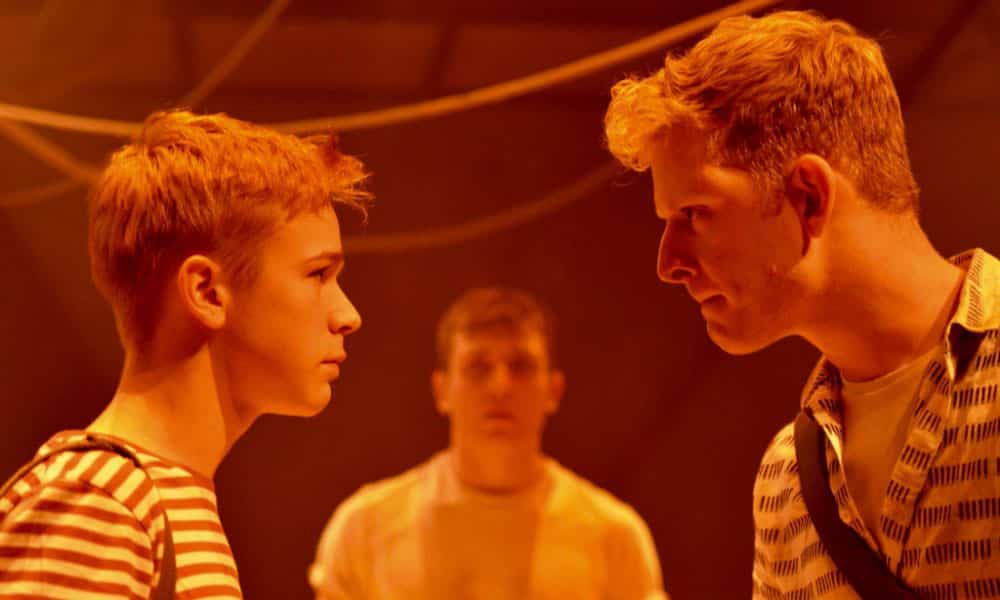
The Burnt Part Boys
Park Theatre
22 August 2016
3 Stars
Matthew Iliffe’s is the driving passion behind this arrival of Mariana Elder’s tale of youthful endeavour and adventure in a West Virginia mining town, laced with Chris Miller and Nathan Tysen’s brisk, bright, country-infused score. He’s come a long way from his capable ‘Thoroughly Modern Millie’ seen at the Landor last season. Now, he has stripped away the paraphernalia of theatre and presents an unbroken 90-minute drama on a virtually bare floor, with – thanks to Rachel Wingate’s design and costumes (just half a dozen wooden chairs and a ceiling draped with a lot of rope), and the trademark genius of Charlie Morgan-Jones’ evocative lighting design. The music comes from Nick Barstow’s tightly run mainly acoustic ensemble, and – in the small Studio space of the Park Theatre – the cast move easily between spoken and (unamplified) sung text. We are in 1962, and hear a radio announcement from the period to confirm this. The realistic feel of the work is emphasised in the often rather thick West Virginia accents. It’s a beautifully complete piece of theatre, and Iliffe’s vivid creation of it makes him clearly someone to watch closely for future developments.
His current choice to display his artistry in direction and musical staging is a virtuoso exhibit, with multiple changes of location, moving from domestic interiors, through a forest, across a mountain, and into a mine, and in and out of different planes of consciousness (perhaps). It is testimony to his ability as a director and choreographer that he achieves this with such naturalness and ease. He stimulates the mind of the audience to imagine, and visualise, and wonder, and think. And think we do. And in this town that he so pungently conjures up in our imaginations, the first thing we really want to know is: Where are all the women?
The world of the animus that is served up to us is weirdly deprived of the counter-balance of anima: we are a long way into the show before a single female presence rather unexpectedly pops up and makes herself powerfully felt – here magnificently played by the intense and energetic Grace Osborn, an actress I have long admired and who, in the opinion of this writer, probably does most to give the show the heart that its plangent, simple melodies evidently crave.
But against her best efforts, the odds are steeply stacked. Two pairs of male friends, Chris Jenkins’ worldly, responsible elder brother Jake, and his boozing companion, David Leopold’s Chet, and youngsters Joseph Peacock’s Pete and Ryan Heenan’s Dusty, each set off on separate journeys into the wilderness, to reach the mine that was abandoned 10 years earlier after a disaster that killed some of their fathers. Around them, a chorus of 5 deceased fathers occasionally appear in order to serenade us, and one of them, David Haydn, gets to become manifest more frequently, as no less a figure than Jim Bowie: his son, the juvenile Pete, lionises the characters of his favourite film, ‘The Alamo’, and seems to fantasize about his late father being him (at least, I think that’s what’s happening).
Now, if you already feel emotionally drawn into this situation, then there is a good chance you’re going to like this show. The director clearly does. He draws on a strong element of American heritage here, drawing on the Twice-Told Tales of Nathaniel Hawthorne, or the romances of other writers of the lyrical, ruralist tradition, or the mysteries of Edgar Allan Poe, and the adventures of boys having to find father-figures in their lives. Indeed, the nearly exclusively male environment seems to recall the philosophical and psychologically questioning stories of Melville. Yet, consider this, when those writers tell stories with mainly men in them, they make it very clear as to why this is so, usually through the choice of setting (a ship at sea, an army on campaign, and so on).
If this is the stuff that fires your imagination, then the show will sweep you along upon its charming way. Iliffe more than does justice to this aesthetic in the production: he glories in it. However, recently in London we have seen other dramas set in mining towns: the three D H Lawrence plays at the Dorfman; ‘Wonderland’ at the Hampstead theatre; and let us not forget ‘Billy Elliot’, which ran at the Victoria Palace for years and is still going strong on tour. Most of those works focus as much on the women in them as on the men. I think there are all sorts of reasons for that. Chief amongst these, perhaps, is the recognition most writers have that if they want audiences to believe in their characters, they have to show them in the fullest way possible; if this does not happen, then audiences may suspect that the creators are holding something back, and then they might be less inclined to identify with their characters, and to feel less disposed to care about what happens to them.
You must judge for yourself whether you think this may or may not the case with this play. Whatever decision you arrive at, you might also like to consider what effect would it have on you were you to know at first hand what the mothers, widows, sisters, cousins or girlfriends of the heroes of the story might have to say. Alright, that would make it a different play. But there’s one girl here, so: Where are all the (other) women?
